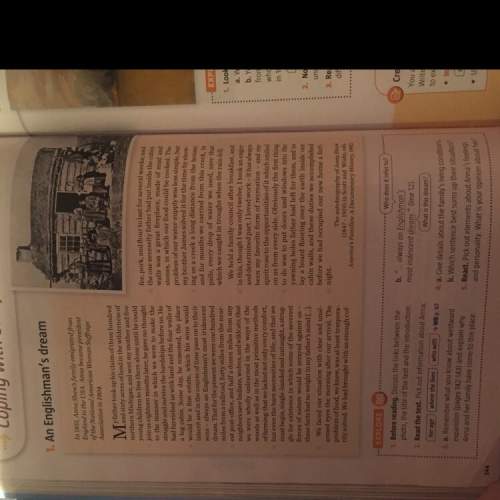
English, 02.08.2019 10:40 emmanuelmashao5504
In at least 150 words, tell how the daughter's personality affects the plot of the story.

Answers: 2


Other questions on the subject: English

English, 21.06.2019 22:00, josephvcarter
Biologists recognize five levels of cell organization. the lowest and simplest is the cellular level. organisms here are either unicellular organisms, like protozoa, or colonial organisms. colonial organisms are composed of single-celled individuals that stay together to sustain the life of the whole colony. next on the scale of complexity is the level occupied by tissue. a tissue is a group of similar cells which perform a similar activity. tissues that are organized around a common function together make up an organ, the third level of complexity. the fourth level of organization is the system, formed by a group of organs which together perform a specific bodily process. the fifth and highest level is the organism level, in which body systems work together in a structure capable of independent life. main idea:
Answers: 3

English, 21.06.2019 23:50, Ancelingabaut
Read the sentence. the judge stated that “the court cannot superimpose its opinion over the opinion of the jury.” what does superimpose mean? a) to take away b) to ignore c) to place over d) to combine
Answers: 2

English, 22.06.2019 04:50, ilawil6545
Read the passage, then answer the question that follows. no one could have seen it at the time, but the invention of beet sugar was not just a challenge to cane. it was a hint—just a glimpse, like a twist that comes about two thirds of the way through a movie—that the end of the age of sugar was in sight. for beet sugar showed that in order to create that perfect sweetness you did not need slaves, you did not need plantations, in fact you did not even need cane. beet sugar was a foreshadowing of what we have today: the age of science, in which sweetness is a product of chemistry, not whips. in 1854 only 11 percent of world sugar production came from beets. by 1899 the percentage had risen to about 65 percent. and beet sugar was just the first challenge to cane. by 1879 chemists discovered saccharine—a laboratory-created substance that is several hundred times sweeter than natural sugar. today the sweeteners used in the foods you eat may come from corn (high-fructose corn syrup), from fruit (fructose), or directly from the lab (for example, aspartame, invented in 1965, or sucralose—splenda—created in 1976). brazil is the land that imported more africans than any other to work on sugar plantations, and in brazil the soil is still perfect for sugar. cane grows in brazil today, but not always for sugar. instead, cane is often used to create ethanol, much as corn farmers in america now convert their harvest into fuel. –sugar changed the world, marc aronson and marina budhos how does this passage support the claim that sugar was tied to the struggle for freedom? it shows that the invention of beet sugar created competition for cane sugar. it shows that technology had a role in changing how we sweeten our foods. it shows that the beet sugar trade provided jobs for formerly enslaved workers. it shows that sweeteners did not need to be the product of sugar plantations and slavery.
Answers: 1

English, 22.06.2019 05:00, josmanu235
"introduction to oedipus the king": what is most likely the author's intent in writing about the difference(s) between sophocles's play and the original myth on which it's based?
Answers: 1
You know the right answer?
In at least 150 words, tell how the daughter's personality affects the plot of the story....
Questions in other subjects:


English, 08.10.2019 02:00


Mathematics, 08.10.2019 02:00





Mathematics, 08.10.2019 02:00

English, 08.10.2019 02:00




